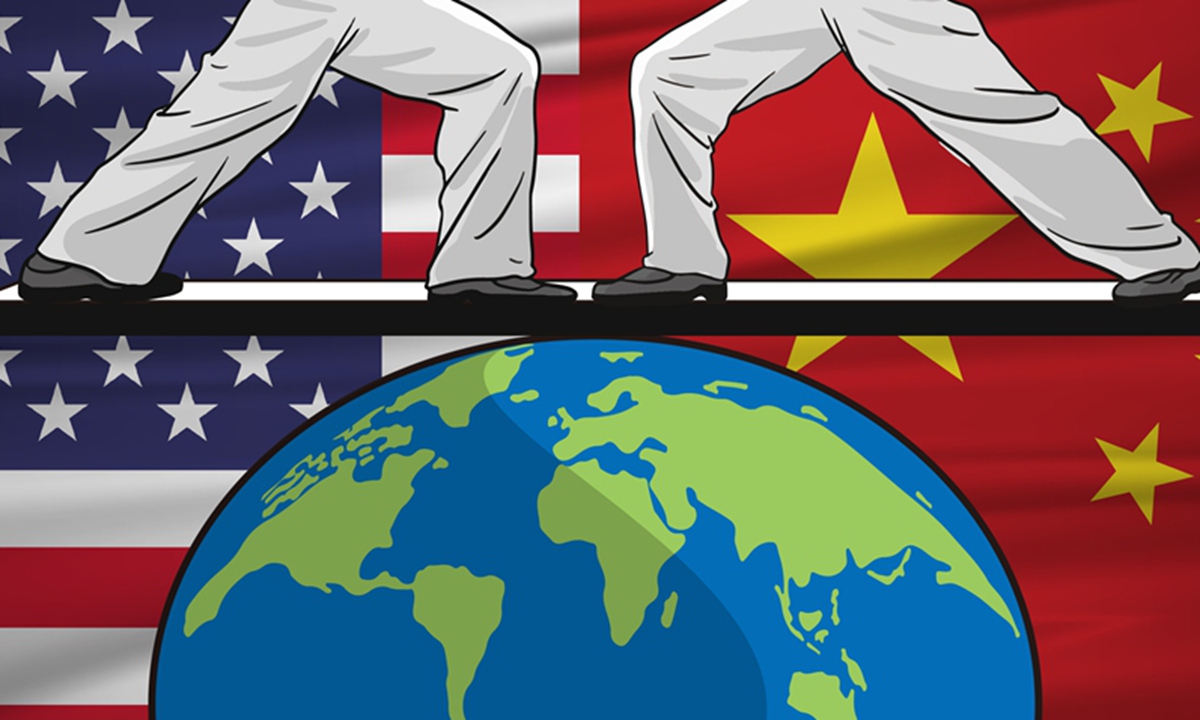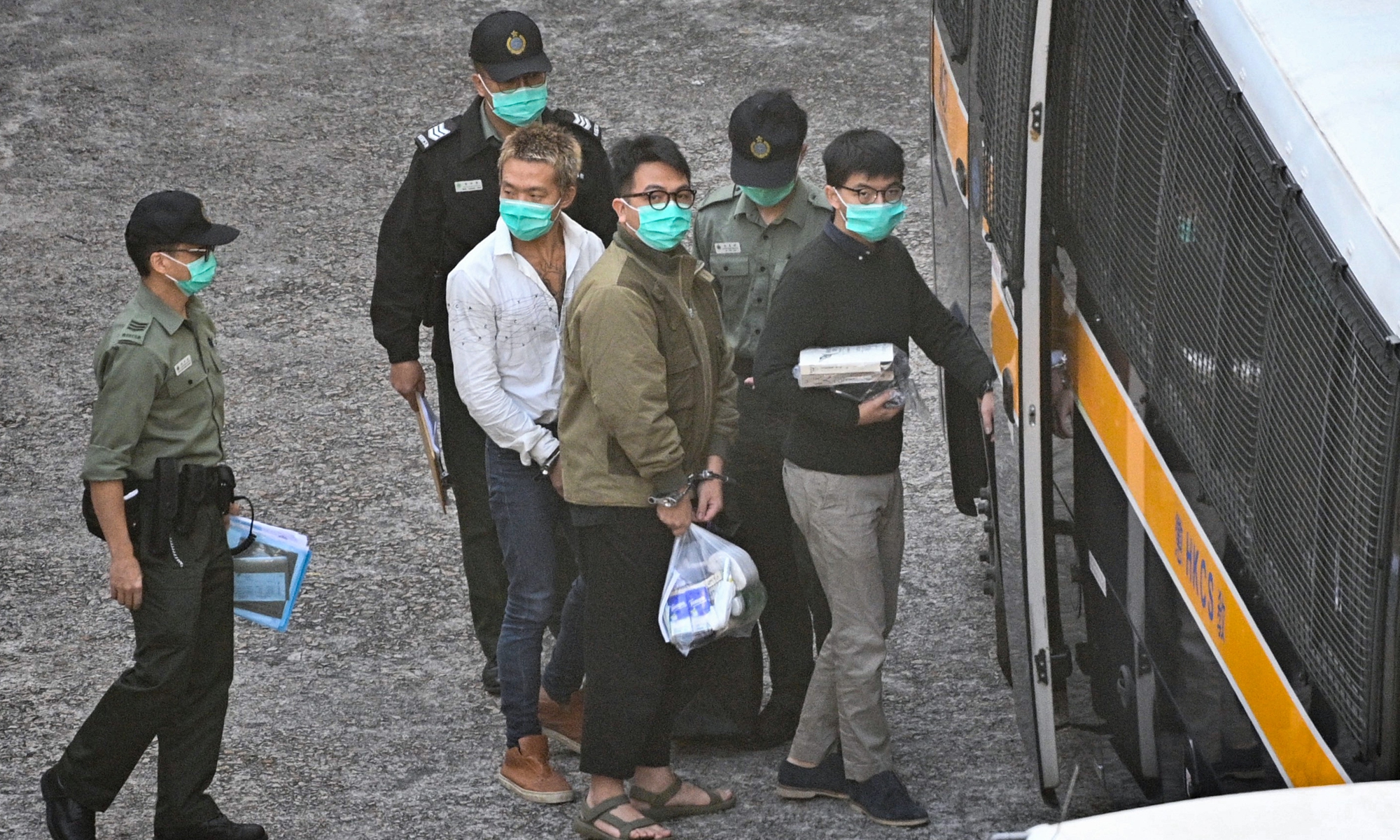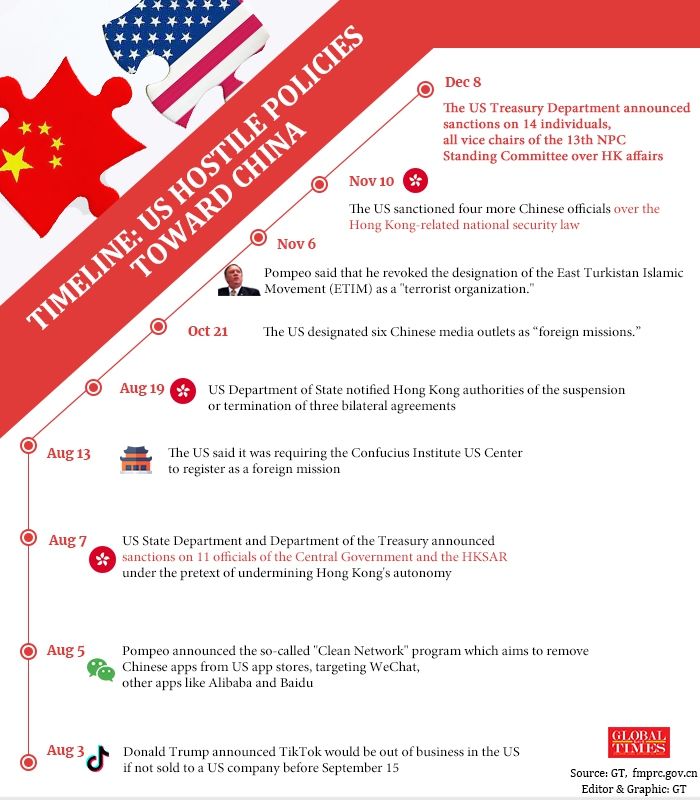US stages 'final hysteria' with sanctions over HK
By Chen Qingqing, Fan Lingzhi and Cui Fandi Source: Global Times Published: 2020/12/8 21:41:11

China US Photo: GT
China on Tuesday summoned the charge d'affaires of the US Embassy in Beijing to protest US new sanctions on senior Chinese lawmakers and vowed to retaliate what has been called the most serious provocation and gross interference in China's internal affairs related to the Hong Kong Special Administrative Region (HKSAR) by the US government.
The response came after the US imposed sanctions on 14 deputy state-level officials of the country's top legislature over a national security law, and passed an immigration bill that could offer safe haven for potential criminals fleeing the city.
Following the US moves apparently guided by final hysteria and bullying tactics of the outgoing Donald Trump administration, various Chinese government departments and senior diplomats made solemn representations with the US and pledged to take "all necessary measures" to safeguard China's sovereignty, security and development interests.
While specific countermeasures have not been announced as of press time, potential responses may include targeting more US lawmakers, and even the US consulate in Hong Kong, analysts said. Aside from direct retaliation, China might also respond to the US interference by firmly carrying out policies for the city, including the national security law for Hong Kong and reforms in the legal, education and civil affairs sphere to further consolidate "the victorious fruits" of the law in the coming months, when the US is in a power transition period, said Chinese scholars and government advisors on Hong Kong affairs.

Ivan Lam (left) and Joshua Wong (right) are seen entering a prison van at Lai Chi Kok Reception Centre in Hong Kong on Wednesday. Hong Kong secessionist Joshua Wong was sentenced to 13.5 months in prison on two charges related to the siege of the Hong Kong police headquarters in June 2019. Fellow secessionist Agnes Chow received 10 months, and Ivan Lam seven months (See story on Page 3) Photo: AFP
'Most severe provocation'
After the Treasury Department imposed sanctions on 11 individuals - officials in the Hong Kong Special Administrative Region (HKSAR) and the Chinese mainland - in August, US authorities put more Chinese officials on the sanctions list by including 14 senior officials from the 13th National People's Congress (NPC) Standing Committee, all vice chairs of the committee. The unprecedented move of directly targeting deputy state-level officials is believed to be the most serious political provocation against top Chinese authorities over Hong Kong affairs, Chinese experts said.
"This is a direct confrontation with China's top legislature, which shows that in his final weeks as president, Donald Trump has not given up in pushing forward its Cold War mentality toward China by escalating tensions, creating more problems for Biden," Tian Feilong, an associate professor at Beihang University in Beijing and a member of the Beijing-based Chinese Association of Hong Kong and Macao Studies, told the Global Times on Tuesday.
In the past year, Hong Kong has become a major card for Trump and anti-China hawks like Secretary of State Mike Pompeo and national security adviser Robert O'Brien to play in attempt to contain China from the strategic and geopolitical perspective. Washington has come up with a series of Hong Kong-related bills since the social turmoil broke out in the Chinese city in June 2019, imposing sanctions on local officials, including HKSAR Chief Executive Carrie Lam.
The US House of Representatives also voted Monday to welcome "Hong Kong residents to live temporarily in the US through the Temporary Protected Status, vowing to be a beacon for rights as China clamps down on the territory," media reported.
Lau Siu-kai, vice president of the Chinese Association of Hong Kong and Macao Studies, called the latest sanctions "the most serious political provocation" from Washington over Hong Kong affairs, but one that will have little practical impact.
Chinese Vice Foreign Minister Zheng Zeguang summoned Robert W. Forden, charge d'affaires of the US Embassy to China to protest the US over its sanctions on senior Chinese officials, and vowed to make reciprocal retaliation against US moves.
"The US barbaric acts would only trigger Chinese people's strong indignation toward anti-China forces in the US and make the 1.4 billion Chinese people, including Hong Kong compatriots, to fully realize the US devious intentions and strengthen the resolve of the Chinese government in implementing the National Security Law for Hong Kong," Zheng said.
Major Chinese government agencies, including the Hong Kong and Macao Affairs Office of the State Council and Chinese Foreign Ministry, also voiced solemn opposition to US latest provocations, calling them "blatant double standards and bandit-style logic." The office called such decision "hysterical political bullying" that goes against the international law and the basic norms governing international relations, as no country would turn a blind eye to acts or activities that endanger its national security, and no country would consent to someone who seeks to split the country, subvert state power or collude with external forces holding public office.
Hua Chunying, spokesperson of the Chinese Foreign Ministry, slammed the latest sanctions on Chinese officials and the bill granting Hong Kong temporary immigration status during a press conference on Tuesday. In disguise for protecting Hong Kong's "democracy and autonomy," the US interfered in Hong Kong affairs through different means, from supporting secessionist activities and riots to sanctioning the NPC Standing Committee vice chairs, Hua said.
"It fully exposes the US' sinister intention to interfere in China's internal affairs, destabilize Hong Kong, and hinder China's stability and development, which will only draw the strong indignation of 1.4 billion Chinese people," she said.
In a separate criticism, Hua questioned the motive of some US politicians who vowed to protect Hong Kong by providing so-called protective citizenship, as the US itself has been mired in a severe pandemic, which has killed over 2,000 a day. "It is hard to believe that these things are happening in the world's most powerful country, which prides itself on being a beacon of democracy and freedom. Shouldn't the rights to life and health be the greatest human rights?" Hua asked, posing serious questions about the true motive of US politicians who claimed to care about the Hong Kong people.
Chinese experts believe that the US lawmakers may push forward more Hong Kong-related bills as the Chinese city will continue being part of Washington's policies in containing the rise of China, hoping to weaken the strategic value of Hong Kong for the mainland.
However, given most bills are repeated through which US lawmakers express their anti-China political stance, they do not have detailed legal provisions. "In other words, the US government will have considerable discretion in interpreting these elements," Lau said.
When it comes to executive orders on Hong Kong matters, Biden could sign new orders to make some changes when he takes office, if he wants to improve the relationship with China, he noted.

Infographic: GT
Necessary, effective response
While the Trump administration has been staging its final madness on Hong Kong and Pompeo even called China's top legislature's decision on Hong Kong affairs an "unrelenting assault against the city's democratic process," Chinese officials urged the US to correct its wrong deeds and stop interfering in China's internal affairs, vowing to take countermeasures resolutely and safeguarding its sovereignty, national security and development.
On possible new countermeasures, Tian said multiple options are open, such as further reducing staff numbers at the US consulate in Hong Kong and their scope of activities.
"China can impose permanent sanctions on US lawmakers who propose Hong Kong-related bills and their relatives, and order the HKSAR government to strictly scrutinize those who seek so-called 'asylum status' and resolutely punish those who violate laws in Hong Kong but obtain the status in the US," he said.
However, some experts pointed out that the most effective and meaningful response to Washington's hysteria would be to focus on "cleaning up the mess" in Hong Kong, setting up rules to restore social stability with the help of the national security law for Hong Kong.
The Hong Kong Police Force and Department of Justice of Hong Kong have been accelerating the handling of major opposition lawmakers who openly encouraged illegal assemblies in 2019, instigated the youth to take part in riots, and employed filibustering tactics to drag out proceedings of LegCo meetings. In the past month, over 30 former opposition lawmakers, district council members and anti-government forces had been arrested, including Leung Kwok-hung, Tony Chung, Wu Chi-wai, and absconding Ted Hui.
Experts also viewed the consecutive arrests as a sign that law enforcement authorities in the city are showing resolve to eradicate secessionist forces and help the city get back to normal.
Joshua Wong, Agnes Chow and Ivan Lam, head secessionists of last year's social turmoil in Hong Kong, also received sentences of various prison terms in December, while media tycoon Jimmy Lai was denied bail and might be detained until April 2021.
We've seen Hong Kong's overall social atmosphere and political environment getting more and more positive, which will effectively counterbalance US moves, Li Xiaobing, an expert on Hong Kong, Macao and Taiwan affairs from Nankai University in Tianjin, told the Global Times on Tuesday.
By enacting the national security law for Hong Kong and setting a series of arrangement for the qualification of Hong Kong lawmakers, the top Chinese authority has been gradually restoring constitutional order in the city, with more reforms anticipated in various areas such as the legislature, education and civil affairs. Over the past year, the US has been losing its ability to turn Hong Kong into a base to subvert China's sovereignty, leaving little room for both official and semi-official forces from Washington, including some anti-China forces, to conduct activities in the city, analysts said.
"In the coming months, we'll continue the victorious pursuit and consolidate the fruits of the national security law for Hong Kong," Li said.
RELATED ARTICLES:
Posted in: DIPLOMACY,HK/MACAO/TAIWAN